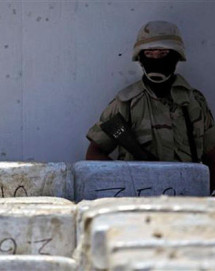The security approach to the drugs problem Perpetuating drugs and conflict in Colombia
Regions
The drugs problem in Colombia is intertwined with structural factors at the social, economic, institutional and cultural levels. Moreover, its relationship to the armed conflict has had serious consequences for the socio-economic conditions of peasant and indigenous communities affected by the production of raw materials used to produce cocaine.

Authors
Drug trafficking and other illegal economic activities are being consolidated through a process that is reconfiguring the State, co-opting State institutionalisation within a dynamic that is legitimizing elites involved with these criminal activities. This situation can be witnessed in different regions around the country. Despite these factors, current U.S. assistance policies with Colombia overlook the structural dimension of the drug problem.
Drugs continue to be a relevant aspect of the threats identified by Washington in the framework of global security and strategies for the Latin American region. As such, the security angle remains the central focus with respect to drugs, but in the background are other key issues, such as access to strategic natural resources. Colombian territory in this context continues to be a platform for regional security control.
CONCLUSIONS & RECOMMENDATIONS
- Assistance should be much more attentive to what is behind the structural factors that have contributed to reproducing the maps of the drug economy. If access to land is one of these factors, assets confiscated from drug traffickers should be used to defend and strengthen peasant economies and the collective territories of Afro-Colombian and indigenous communities.
- The Colombian government should review the strategic scope of the current regionalization model, which is based on the results of the State offensive and its consolidation. More effective action against drug trafficking would come from recognizing the existence of illegal regional elites who have co-opted a large part, if not all, of local State institutional structures.
- Drug production and trafficking could be fought more effectively if the State impeded support for local orders and arrangements dominated by illegal regional elites and traditional powers linked to drug trafficking.
This could be done by creating watchdog groups to oversee the rule of law and defence of justice, consequently strengthening citizen control.
- Support for military bases as part of U.S. anti-drug assistance is counterproductive in terms of regional stability. A joint action on the part of the region’s countries, which could be coordinated by a regional body such as UNASUR, would play a more constructive role.
